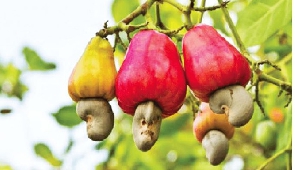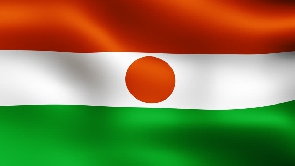The country is increasingly losing its credibility as a source of quality cashew nuts due to bad post-harvest practices by some farmers and aggregators, Jerry Anim of the Directorate of Crop Services at the Ministry of Food and Agricultural has disclosed to the B&FT.
Ideally, the international market requires that cashew nuts are dried to at least 10 percent moisture content in order to meet the kernel outturn ratio (KOR); but some recalcitrant farmers and aggregators are in the habit of not allowing nuts to dry to the desired standards before releasing them onto the market – raising concerns from buyers over the quality of nuts from the country, according to the Tree Crops Development Authority (TCDA).
As a result, Mr. Anim – who is in charge of cashew development at the ministry – said the country in the past two years has lost its credibility in terms of providing quality cashew nuts on the world market.
“Some aggregators follow cashew farmers to their farms and buy right after picking just to beat competitors. Since moisture level is high, respiration continues to take place – causing the nuts to grow mould before reaching their destination during exportation,” he fumed.
Mr. Anim further disclosed that last year cashew nuts which were in terrible condition upon reaching final destinations were rejected – and this made other traders who had not exported their products to mix the bad nuts with healthy ones which were cultivated during the recent season, resulting in the loss of trust for Ghanaian cashew and loss of buyers.
Mr. Anim therefore condemned the practice of aggregators buying from farmers straight after harvest in order to beat competition.
“We as regulators are putting up a set of regulations for presentation to parliament for approval. The regulations will help restrict aggregators from buying the nuts right after picking, and also before any produce leaves the country’s shores there will be an independent quality check to ascertain its quality,” he said.
Dry cashew to 10% moisture content to meet KOR – TCDA
The deputy Chief Executive Officer of Tree Crops Development Authority, Foster Boateng, is urging cashew farmers and processors to dry their nuts to at least 10 percent moisture content in order to get good market value for them and to meet the kernel outturn ratio.
He explained that when cashew nuts are not dried enough and do not meet the KOR – which is measured between 46 and 48lbs, it loses value on the market; hence, it is important for the nuts to be dried to the desired moisture content before being released onto the market.
Explaining further, he said during the first harvest season between December and January, farmers are able to provide aggregators with well-dried cashew nuts; which in consideration made them pay GH¢13 instead of GH¢8.50 being the estimated farm price.
However, Mr. Boateng indicated that the quality of cashew nuts drops during the second season, which is between March and April during the rainy season.
He further stated that the competition between cashew farmers in Ghana and Cote d’Ivoire during the second season is another factor influencing farmers to supply moist cashew to the market.
He said: “During this period, farmers are not able to dry crops properly due to rain; and also it is during the second season that Cote d’Ivoire harvests their cashew. In order to compete with them, farmers do not wait for their produce to dry.
“Cote d’Ivoire has a much lower minimum farm gate price for their cashew nuts than Ghana and also produces in larger volumes – resulting in aggregators choosing to patronise that of Cote d’Ivoire instead of Ghana’s during this period,” he told the B&FT.
Mr. Boateng also revealed that TCDA, as a regulator, is engaging all players in the cashew value chain as part of efforts to dialogue, renegotiate and establish a price formula for both farmers and aggregators.
He also indicated that the meeting of stakeholders will not only be about renegotiations but also to educate them on the consequences of their actions.
Business News of Thursday, 4 May 2023
Source: thebftonline.com













